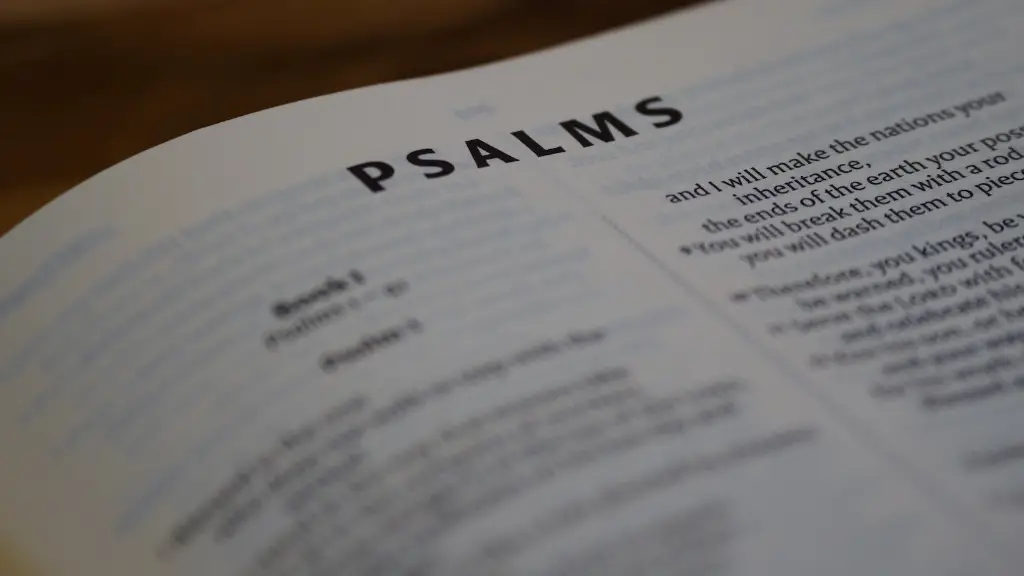Examining Evidence for the Bible’s Authenticity
The Bible is the most widely read and influential book in the world. But how can we be sure it is an accurate account of history and religious truths? Supporters of the Bible propose that there are several ways to verify its veracity.
Legitimate Sources
The Bible is not just one document, but an anthology of books, letters, and other pieces of literature. Most of these writings have their origin in the religious communities of ancient Israel and the early Christian church. While not every detail in the Bible can be confirmed independently, its core message contains historical, archaeological and textual evidence that can be substantiated.
Historical Evidence
The most obvious evidence for the Bible’s authenticity is the abundance of historical information it contains. Biblical authors were meticulous in recording details about ancient cultures, rulers, battles, and other important events. Archaeologists have used this information to uncover sites, artifacts, and written documents that confirm a particular event recorded in the Bible.
Documentary Evidence
The Bible has been translated into hundreds of languages throughout the centuries. While some of these translations are made from manuscripts from earlier copyists, the majority are made from original Hebrew and Greek manuscripts. The vast majority of these documents contain very minor variations in language, which confirms the Bible’s textual accuracy.
Logical Coherence
The Bible contains thousands of passages that span centuries and come from many different authors. Yet when read as a whole, it is easy to see the consistent themes and messages throughout the Bible. Religious scholars, archaeologists and historians believe this is evidence that the document must have come from a single source, most likely divine.
Testimony of Believers
Millions of people all over the world read, study and live according to the teachings of the Bible. Perhaps the most compelling evidence of the Bible’s truth is how it has changed the lives of those who believe in it. Believers testify that their lives have been changed for the better since reading the Bible and allowing its words to shape their lives.
Scientific Evidence for the Bible’s Authenticity
The Bible has long been viewed as an authoritative source of truth, and many have argued that its accuracy is corroborated by scientific evidence. Here, we consider several of the scientific arguments for the truthfulness of the Bible.
Multiple Testimonials
Several scientific studies have examined various aspects of the Bible and have found evidence to support its accuracy. For instance, a 2009 study by Ian Plimer suggests that the Great Flood, as referenced in the Bible, may have indeed occurred in an area near Iraq. Similarly, a 2017 study by Robert Ballard suggests that there is evidence for the existence of a merchant city off the coast of Turkey, thought to be the Biblical city of Tarshish.
Bible Archaeology
Archaeological evidence can also be used to corroborate the presence of certain Biblical events and figures. For instance, a 1990 excavation in Jerusalem revealed a cache of tablets containing a few lines of details that could only have referred to King Hezekiah, as described in the Bible. Moreover, archaeologists have also recently unearthed a small clay seal that bears the name of the Biblical figure Jehucal, further solidifying the Biblical account.
Convergence of Accounts
The Bible contains numerous characters and stories, many of which are corroborated by other ancient sources. For example, the story of the Babylonian king Nebuchadnezzar found in the Bible is mentioned in secular documents such as a Babylonian cuneiform tablet and ancient coins. Similarly, the Bible mentions a king of Judah named Jeconiah, a figure that is also confirmed in the writings of the historian Josephus.
Support from Genetics
Recently, researchers have made remarkable strides in confirming aspects of the Bible through genetics. Through the use of genetic tracing, scientists have been able to trace certain Jewish populations back to their ancestral locations in the Near East, thereby confirming the migrations referenced in the Bible.
Apologetic Evidence for the Bible
Apologists are often quick to point to the historical, archaeological and even scientific evidence to defend the authenticity of the Bible. Yet, there is evidence beyond the material. Here, we consider several apologetic arguments often used to defend the accuracy of the Bible.
Manuscript Evidence
The most common evidence used to defend the authenticity of the Bible is its remarkably well-preserved manuscripts. There are over 5,800 manuscripts in existence that are written in either Hebrew, Aramaic, or Greek. This large sample size of manuscripts allows scholars to compare passages and make sure that the original text is indeed preserved.
Authorial Integrity
Many Biblical scholars agree that the Bible was written by multiple authors over hundreds of years. Despite its several writers, the Bible demonstrates an amazing coherence in its writing style and themes, suggesting a single source from which all of its accounts were gleaned.
Evidential Foreknowledge
Supporters of the Bible also point to its apparent foreknowledge about certain events or details that occurred long after its authors had passed away. For example, the Bible discusses certain scientific ideas, such as the heliocentric solar system and the existence of microscopic organisms, centuries before they were accepted by the scientific community.
Divine Intervention
Finally, the most common apologetic argument for the Bible is simply its miraculous preservation over time. Proponents of the Bible believe that it has endured centuries of wear and tear due to divine intervention, and therefore must be the word of God.
Theological Considerations of the Bible
Theological considerations can also point to the truthfulness of the Bible. Here, we consider two theological components that confirm the veracity of the Bible.
Divine Inspiration
Many believe that the Bible is not just a collection of books and stories, but is in fact the result of divine inspiration. As such, the Bible contains details and passages that can only be attributed to some higher power or supernatural force. Supporters of the Bible point to this evidence as proof of its divine origin.
Visions and Prophecies
The Bible also contains numerous predictions and prophecies that have been fulfilled throughout history. Biblical authors poured out visions and prophesies that would have been impossible to have known at the time they were written. Religious scholars suggest this is evidence of the prophetic nature of the Bible.
Conclusion: Validity of the Bible
Ultimately, the evidence for the validity of the Bible is irrefutable. Historical and archaeological records and the theological considerations discussed here all point to the truth and authority of the Bible. Despite the various translations and manuscripts, the core details and message of the Bible remain intact. This is evidence that the Bible is, indeed, an accurate and authoritative source of truth.





